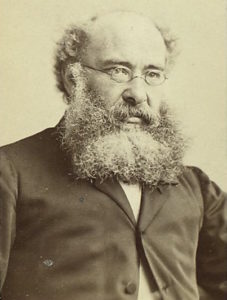The Victorian writer Anthony Trollope is my writing mentor. He is the one who keeps my feet on the ground when it comes to writing and writing fads. For even though he lived in the 19th century (1815-1882), he was very much a 21st century indie author in sentiment.
In his own day, he was a popular novelist. Not on par with the likes of Dickens or Thackeray, nevertheless his name was more or less a household word. He wrote what would probably be called today slice-of-life mainstream fiction. Novels about the goings on of upper-class English society, for the most part. His books tend to be light, have plenty of humor, and a healthy dollop of social satire.
What can today’s indie authors learn from Anthony Trollope? Just about everything to guide and direct our attitude and to developing a methodology towards maintaining a writing career.
Let’s look at a few areas where I see my fellow authors struggling to come to grips with the writing life and where Trollope can teach us valuable lessons.
Quitting the Day Job
On Facebook group after Facebook group, I see my fellow writers in a frenzy to write and sell enough in order to quit the day job and write full-time. And in this frenzy they fall victim to all manner of hucksters selling (operative word here) services and advice. (NB: I don’t mean all the middlemen catering to writers are hucksters. Just remember, though, PT Barnum’s quip: a sucker is born every minute. We should strive to not be the suckers.)
Anthony Trollope, on the other hand, shows us we can write full time by writing part-time.
Anthony Trollope was a busy man. He worked full time at the post office (he invented the iconic British pillar mailbox). He was a social man. He went hunting at least twice a week, frequently played whist, visited with friends, and spent at least six weeks out of England on holiday. He was also married and had a family. He was a very busy man indeed! He did all of that and devoted three hours every day to writing, which he did in the morning before going to work.
And from those three hours each day of writing he produced a large body of work. In the course of a 35 year writing career he produced 47 novels, 44 short stories, 17 books of nonfiction, 20 articles, 2 plays, plus numerous letters.
Anthony Trollope proves one does not have to quit the day job to be a full-time writer. Because one can be a full-time writer writing only part-time.
Productivity
Go to any Facebook writer’s group and at some point a discussion will arise regarding writing speed and daily word production. One can find books on how to produce 5000 or 10,000 words a day. Of course those books are for sale, which gives us an idea as to how those authors earn their living. One of the latest fads on how to get more production is dictating one’s novel. And the fads keep on coming.
In the end, the only way to produce a high word count each day is to put your butt in your chair and write. Avoid distractions and write.
One hundred sixty years ago, Anthony Trollope showed us a very simple way to produce enough words in a year to be a prolific author. In his own day, Trollope was known as The Writing Machine.
He got up at 5:30 AM to began his three hour stint at writing. The first half-hour was spent reviewing the previous day’s work.
Then he put his watch on his desk and began writing for 2 1/2 hours. Trollope’s goal was to write one page, 250 words, every 15 minutes. At the end of his writing session, he’d have 10 pages or 2500 words.
If a writer today maintained Trollope’s pace every day for a year, he or she would have written 912,500 words. That’s very close to what Dean Wesley Smith calls “Pulp Speed” (which is writing over 1 million words per year). Those 912,500 words are enough for ten or eleven 80,000 word novels. Seriously folks, do we need to produce more than that in a year?
Trollope proves no writer needs to resort to Herculean efforts to produce a sizable body of fiction. Ten novels a year writing part-time is nothing to sneeze at.
Rewriting
Part of the key to high word counts is not rewriting and minimal editing.
Anthony Trollope did not rewrite. He also essentially did no editing. When he finished a manuscript he was for all intents and purposes finished with it. He sold it to the publisher as is. If the publisher did any editing after they got the manuscript, we don’t know. I doubt they did a lot, because mid-series in The Barchester Chronicles Trollope changed the name of one of his characters. He didn’t catch it and neither did the editor, if there was one.
As Dean Wesley Smith points out in his blog post on pulp speed writing, prolific authors don’t rewrite. They basically don’t have time to invest that much effort into any given manuscript. The prolific writer writes, it’s as simple as that. The goal isn’t perfection, the goal is production of decent and acceptable work.
I hear writers all the time talking about the number of edits they put a manuscript through, the number of beta reads, and how many professional editors they hire. Whereas, if they had gotten the manuscript right the first time they could’ve saved themselves a lot of time and money. And maybe even written another book.
Now I’m not advocating for sloppiness. I take pride in my work and while I don’t rewrite I do perform a modicum of editing. I make sure that I catch as many typos as I can and get rid of as many clunky sentences as I can. Which is basically what the pulp fiction writers did. And Anthony Trollope was setting the pattern long before the pulp fiction era.
Get in practice to write it right the first time. Academicians, who don’t make their living by writing, have spun the myth that the first draft is crap. There are scores of writers who made and make their living writing who say that advice is crap.
Write so your story is right when it goes on paper the first time. It saves time and money in the long run and time and money equals more books, which means more money — for you.
Next week we’ll continue our look at what Anthony Trollope can teach us writers in the 21st century.
Trollope is a person who can show us how to triumph in adversity, set a dream for ourselves, and through perseverance and astute observation achieve that dream.
You can get Anthony Trollope’s Autobiography for free at Project Gutenberg. It’s a marvelous handbook for success.
As always comments are welcome, and until next time happy reading and writing!
Share This!


This is a good read for high school English students.
Glad you think so!